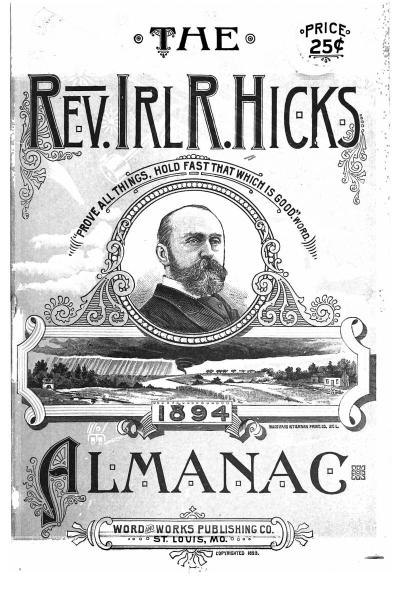 Almanacs were standard literature in most Nebraska homes in the late 1800s and well into the 1900s. These calendar-like handbooks were compendiums of odd bits of knowledge, notations of anniversaries, statistics of all kinds, planting dates, advice for housewives, logarithm charts, jokes, weather forecasts, and even fiction and poetry.
Almanacs were standard literature in most Nebraska homes in the late 1800s and well into the 1900s. These calendar-like handbooks were compendiums of odd bits of knowledge, notations of anniversaries, statistics of all kinds, planting dates, advice for housewives, logarithm charts, jokes, weather forecasts, and even fiction and poetry.
There were varying opinions about the accuracy of the weather forecasts in almanacs. Columnist A. L. Bixby of the Nebraska State Journal wrote in his “Daily Drift” column on November 17, 1899:
A kind friend has favored us with a copy of [the Rev. Irl R.] Hicks’ weather forecast for November. It contains nothing very important nor so very different from the horoscope of a year ago and the several preceding ones for the same month.
According to this prince of weather fakirs the month was ushered in simultaneously with a Vulcan storm period yielding rain and snow and followed by a cold wave of decided virulence which would ripen and fall off about the 6th. The next thing was to be something different lasting about five days. Beginning on the 11th and enduring until and including the 14th, we were promised a ‘Vulcan perturbation, blended with Mercury and Mars.’ We should imagine that a Vulcan perturbation all by itself would be bad enough but when you come to blend it with Mercury and Mars, it must be a mighty serious mix-up. Added to that the moon was in perigee and the fusion forces in Nebraska looked to be in about the same condition.
Weather reports from over the country indicate that November has been an exceptionally mild month up to the forepart of yesterday, and it will have to hurry if it cuts up any serious didoes between now and the appearance of December. One would suppose that when Mercury and Mars blend with Vulcan, atmospheric disturbances of unusual severity must be the result, but the only particularly trying things we have had to contend with are the operations of the Goebel law in Kentucky [on election reform] and the increased price of anthracite here at home.
As we have said before Hicks isn’t even a shrewd guesser, for with all the latitude he gives himself, he doesn’t approximate the truth more than about once in about seven times.




